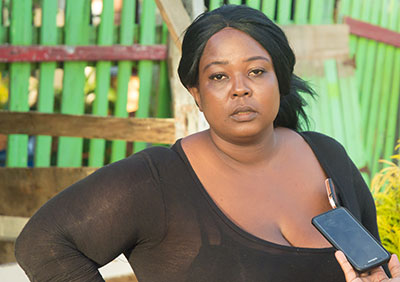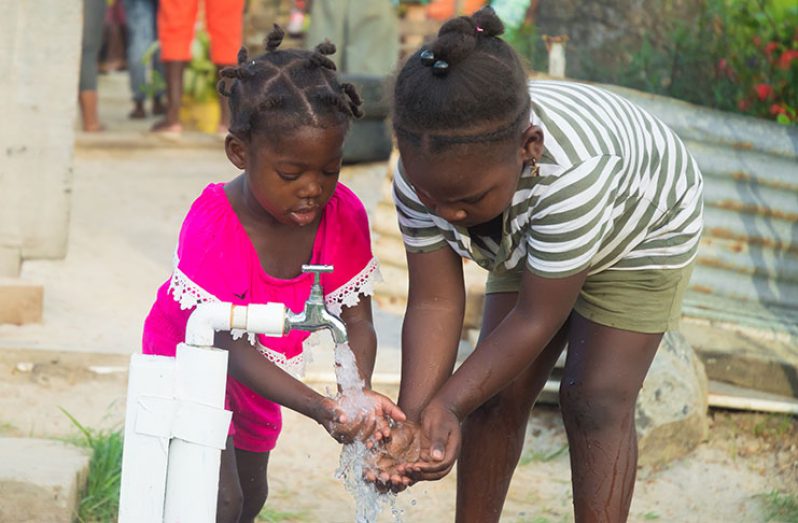THE struggle to access potable water in Durban Backlands Squatting Area is no more, now that the Guyana Water Incorporated (GWI) has commissioned 29 standpipes in the community pending its regularisation.
Minister of State Joseph Harmon and GWI’s Managing-Director, Dr. Richard Van-West Charles, commissioned the water network system, on Saturday. This now allows the more than 3,000 residents squatting in Durban Backlands, aback the Chinese Embassy, to have access to potable water 24/7 at 29 strategic locations.

During a simple ceremony in the area that attracted scores of residents, the GWI managing-director said the move to address the issue which spans decades aligns with the theme for World Water Day 2019, that is, “Leaving no one behind.”
As part of government’s mission to bridge the social divide between the coastland and the hinterland, the ‘served’ and the ‘underserved,’ GWI will be commissioning a number of projects throughout communities across the country to improve their access to potable water.
ERADICATE INEQUITIES
Dr. Van-West Charles told the residents that GWI’s programmes are guided by the United Nations (UN’s) Sustainable Development Goal No. 6, which underscores the importance of providing “clean water to all,” and President David Granger’s quest to eradicate the inequities on the coast or the coast and the hinterland of Guyana.
He said in the case of the Durban Backlands Squatting Area, GWI, in deciding on the project, took into consideration the essential nature of the commodity (water), and its importance to good health and proper hygiene.

(Photos by Delano Williams)
“While it is not fully laid out, we sought at best how we could bring water to this community. Initially, we thought that we were going to put about 17 standpipes but after walking around, we ended up with 29 standpipes,” Dr. Van-West Charles said.
He noted that GWI will also treat with the issue of sanitation within the squatting community. “To the eastern end of this community is the conservancy. Most of the people in Georgetown receive their water, which is treated in the Shelterbelt in terms of the supply of water to Central Georgetown, [from the conservancy]. So we are working to ensure that there is no movement of infiltration or pollution at that end in terms of the conservancy,” the GWI managing-director told the residents.

He, therefore, urged the residents to protect the system from any leakages. “This is water that you can drink. It is safe water, but you have to care it,” he implored those present.
Dr. Van-West Charles said the standpipe is just a starting point. “As I said, we cannot move as of getting water into your homes, because we have to work with the Central Housing and Planning Authority; but the 29 standpipes are close to the homes,” he posited, emphasising that the best days are yet to come.
The managing -director strongly believes that GWI will attain Sustainable Development Goal No. 6 by 2025, five years ahead of the 2030 deadline. Since 2015, approximately 75,000 Guyanese gained access to potable water, adding to the hundreds of thousands already receiving.
Minister Harmon affirmed that establishment of the water network system in the area previously deprived of water is in keeping with government’s agenda.
GOOD LIFE
“The philosophy of our coalition, the philosophy of President David Granger is that we must guarantee and provide a good life for all of the citizens of this country; and that life means different things to different people. To you here today bringing water into this community is that good life, to other persons who might have been accustomed to having water in their communities, maybe fixing the pipe for them, would be something for them; but to you, because water is being provided to your homestead for the first time in so many years, this is in fact the government bringing to you that good life that we promised,” Minister Harmon explained.
He told them that installation of the standpipes is not the end, but rather the beginning of greater things to come as he too underscored the importance of regularising the community first.
He said GWI has been working extremely hard to satisfy the requirement outlined in the SDGs, noting that in recent months, the government through the water authority has delivered water to far-flung communities of the country. In South Rupunnuni, eight artesian wells have been drilled by the Government of Brazil through the Sixth Battalion Engineering Corps (BET) of the Brazilian Army, the Guyana Defence Force (GDF) and the Guyana Water Incorporated, he pointed out.
Constituency Nine Councillor Shonelle Smith-Daniels and local leaders applauded the move by the government. Beneficiaries like Mariah Henry and Keith Hughes applauded the move, noting that they would no longer have to “fight over” the two standpipes that all 3000 plus residents depended on for water.



.jpg)









